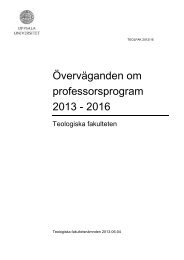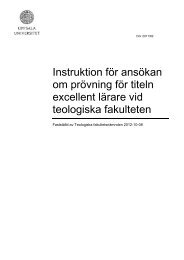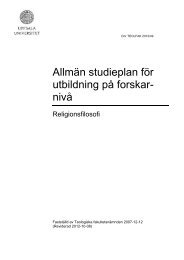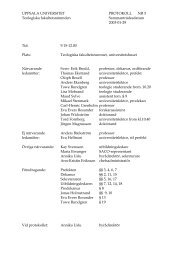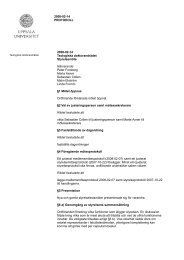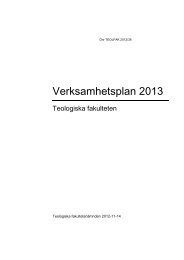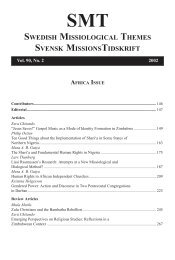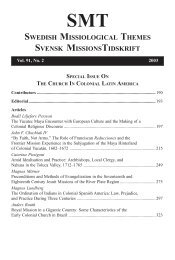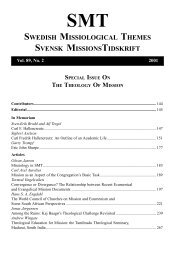SWEDISH MISSIOLOGICAL THEMES SVENSK MISSIONSTIDSKRIFT
SWEDISH MISSIOLOGICAL THEMES SVENSK MISSIONSTIDSKRIFT
SWEDISH MISSIOLOGICAL THEMES SVENSK MISSIONSTIDSKRIFT
You also want an ePaper? Increase the reach of your titles
YUMPU automatically turns print PDFs into web optimized ePapers that Google loves.
484 Tormod Engelsviken<br />
twelve and Paul, and in a wider sense of anyone sent out from a church<br />
with the gospel message (Acts 14:4,14). In the narrow sense in the Lukan<br />
writings it denotes those who had accompanied Jesus during his earthly<br />
ministry, witnessed his death and resurrection and received a direct and<br />
personal call from the Lord (Acts 1:21-22). The concept of “apostle” in the<br />
New Testament may draw on the person and ministry of the prophet in the<br />
Old Testament as being sent to the people by God, as well as on the Jewish<br />
institution of sjaliach, a person sent by others, e.g. the Sanhedrin, with<br />
authority to act and speak on their behalf within the limits of the task given.<br />
In the history of the church, different aspects of the ministry of the apostles<br />
have been emphasised, causing debate and divisions. Their roles as church<br />
founders and missionaries have, however, been underlined from the<br />
beginning. Toward the end of the sixteenth century, there was a conflict<br />
between the Roman Catholic Robert Bellarmine and the Lutheran<br />
theologians about the apostolicity of the church. 7 Bellarmine maintained<br />
that the Lutheran church – differently from the Roman Catholic Church –<br />
lacked characteristic marks of the church, namely apostolicity and<br />
catholicity, because it was not a missionary church and was not found in all<br />
parts of the world. The Lutheran Johann Gerhard responded by asserting<br />
that apostolicity consisted in faithfulness to the teaching of the apostles as<br />
found in the Bible, and that in this regard the Lutheran Church was the<br />
more apostolic. “In the polemic of Lutheran Orthodoxy against the Catholic<br />
Counter-Reformation, the Lutheran church could claim for itself the marks<br />
of the true church without actually supporting a missionary apostolate.” 8<br />
This answer implied a negative attitude to mission and it reached a climax<br />
in 1651 when the Wittenberg theologians declared that the apostolate had<br />
been a personal privilege of the apostles that did not apply to their successors.<br />
The Great Commission was not any longer valid since it would be imply<br />
that all ministers had to go to the heathen, which would be absurd. Moreover,<br />
the pagans already had had their opportunity (cf. Rom 10:18; Col. 1:23),<br />
and God was not under any obligation to give them a second chance. The<br />
orthodox theologians argued that the apostles alone had miracle working<br />
power and the privilege of infallibility. These aspects of their apostolic<br />
ministry were therefore unique, while other aspects such as preaching the<br />
7 See to this Scherer 1987:67-70; Berentsen 1990:18-26; Berentsen 1994:112-114<br />
8 Scherer 1987:68



